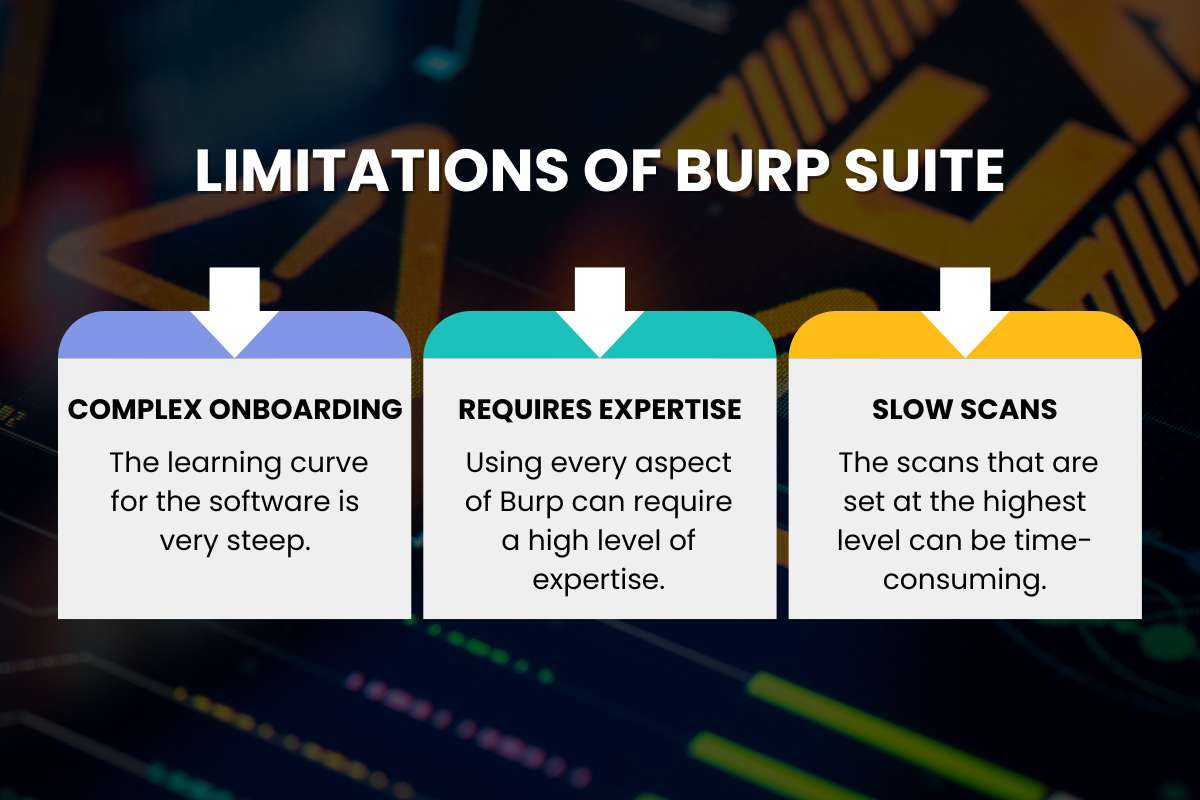Businesses and institutions employ different cybersecurity measures to protect themselves. They are always looking for areas to strengthen and protect. The search for weaknesses is done through penetration testing. Also known as a “pen test,” it is a mock cyberattack that is launched against a security system, exposing any existing vulnerabilities. Any found flaws can then be removed or repaired. But how can you conduct a mock cyber attack? Enter Burp Suite. In this article, we will look at its features and how it helps in penetration testing. So, let us begin.
What is Burp Suite?
Burp Suite, or ‘Burp,’ is a software that has a set of tools. It is developed by a company named PortSwigger. The software aims to be an all-in-one set of tools. Its capabilities can also be enhanced by adding updates.
It has gained popularity amongst bug bounty hunters and web security researchers. This is because it is a prominent web security solution. Burp can identify common security flaws like cross-site scripting and SQL injection attacks. It can also easily integrate with other cybersecurity and software suites. Furthermore, it can give the user the ability to manually test for vulnerabilities and intercept HTTP messages.
It is also very simple to use. This is why many people prefer Burp Suite over other free security testing software. The software is comprised of a set of tools that can scan for vulnerabilities. What are the tools?
8 Tools That are Included in Burp Suite

1. Spider
It is a web crawler that is used to target web applications. It is also known as a ‘crawler’ or ‘web crawler’. The objective of the spider is to map a list of endpoints. These endoponts can then be observed and checked to see if they are functional. In essence, the spider is a cartographer. It follows discoverable paths. Along the way, it extracts URLs, inputs, and parameters. The end goal of a spider is simple: It discovers areas where a potential attack might occur. This endpoint is where a mock attack will be carried out.
2. Intruder
The next feature is the Intruder. It is also known as a fuzzer. True to its name, the intruder injects malware into a system. It does this by running a set of values through an input point. The values act as a payload.
The Intruder is essential in understanding how applications respond to unexpected malicious input. Security professionals can configure payloads using built-in generators. They can test the system for SQL injection and cross-site scripting (XSS). By using Intruder, web applications can be strengthened before they are attacked.
3. Proxy
Burp Suite also contains a proxy feature. This feature allows the user to modify requests while they are in transit. Cybersecurity professionals can intercept requests and responses in real-time. A proxy acts as a middleman between the server and the web browser. It can be configured to accept or reject requests automatically.
A proxy can also provide tools to navigate large volumes of traffic. It can also integrate with other tools like the Intruder and the Scanner. This allows for a seamless workflow.
4. Sequencer
The sequencer is a tool that checks the randomness of tokens generated by a web server. These tokens are used for authentication purposes. Cookies are an example of these tokens. A random set of tokens is generated for every session that a user logs into. Predictable tokens can allow hackers to hijack a session.
The Sequencer collects a large sample of tokens. It then applies statistical analysis to determine how much randomness is present. It’s useful when testing login systems, password reset mechanisms, or API keys. These are the places where token randomness needs to be the strongest.
5. Decoder
The Decoder tool interprets and manipulates encoded data. Many web applications use encoding techniques to protect data in transit. Attackers often exploit any weaknesses that might exist in the encoded data. The Decoder assists by providing decoding and encoding functionality.
By decoding the data, testers can uncover any hidden malicious script. The tool also supports chain decoding, where multiple layers of encoding are applied. It can integrate smoothly with other Burp Suite tools. Decoder empowers testers to understand how applications handle encoded data.
6. Repeater
This tool is similar to the Proxy tool. It enables testers to manually manipulate HTTP requests. This is not an automated tool. It provides users with control over every aspect of requests. Testers can assess how an application deals with altered data. It is widely used in authentication mechanisms and session management.
Through Repeater, testers can send requests again and again. They can then use this data to analyze server behavior.
7. Extender
The extender can expand the functionality of the overall suite. It can add custom plugins, scripts, and extensions. Many specialized tools are required while testing cybersecurity. They are needed to create specific scenarios. Analysts can integrate their own scripts into the testing workflow. For example, an organization might write an extension that integrates vulnerability scanners.
An extender can automate the testing process. It helps in meeting new challenges while providing flexibility.
8. Scanner
The Scanner is an automated tool that assesses vulnerabilities. It crawls endpoints, tests inputs, and identifies any weak spots. It probes for vulnerabilities like server-side request forgery
(SSRF) and directory traversal.
It can make a detailed report of its findings. It can also provide severity ratings and mitigation steps for specific vulnerabilities. The benefit of the automation that the scanner tool provides can reduce human error.
Benefits of Burp Suite

Using the software with all its tools and capabilities can offer many benefits. Some of the major ones include:
1. Comprehensive Web Security Testing:
Burp Suite provides an all-in-one platform for scanning, intercepting, and manipulating web traffic. This allows cybersecurity professionals to identify vulnerabilities like SQL injection, XSS, and insecure authentication efficiently.
2. Customizable and Extensible:
With its Extender tool and BApp Store, the software allows integration of custom scripts and third-party extensions, enabling testers to tailor functionality to unique testing scenarios and adapt to emerging threats.
3. Manual and Automated Testing Capabilities:
The software enables automated scanning and manual testing, giving security analysts the flexibility to perform in-depth reconnaissance, craft precise attacks, and verify vulnerabilities with high accuracy.
Limitations of Burp Suite

Burp Suite offers features far and wide. Their extensive set of cybersecurity tools has become essential. But the toolkit also has its limitations. They are:
1. Complex Onboarding:
The learning curve for the software is very steep. This is especially true for individuals who are new to cybersecurity testing tools as a whole.
2. Requires Expertise:
Using every aspect of Burp can require a high level of expertise. It also requires a deep understanding of attack vectors. This can limit the use to only experienced individuals.
3. Slow Scans:
The scans that are set at the highest level can be time-consuming. This can slow down urgent projects that are high priority.
Case Study: What Augmedix Has to Say About Burp Suite

Augmedix is an enterprise in the healthcare sector. It helps clinicians better focus on patient care. Healthcare is a sector that requires stringent compliance. Which is why companies like Augmedix require security testing software. Augmedix allowed its cybersecurity team to use Burp Suite.
The Results:
1. Augmedix discovered hard-to-find vulnerabilities.
2. They were able to speed up penetration testing
3. It had all the features needed in one product
Conclusion:
Burp Suite is an indispensable tool for cybersecurity. Its powerful features make it a top choice for security analysts. It can help in finding weaknesses before attackers can exploit them. Investing time in learning this tool can improve your security and ensure a secure digital environment.






